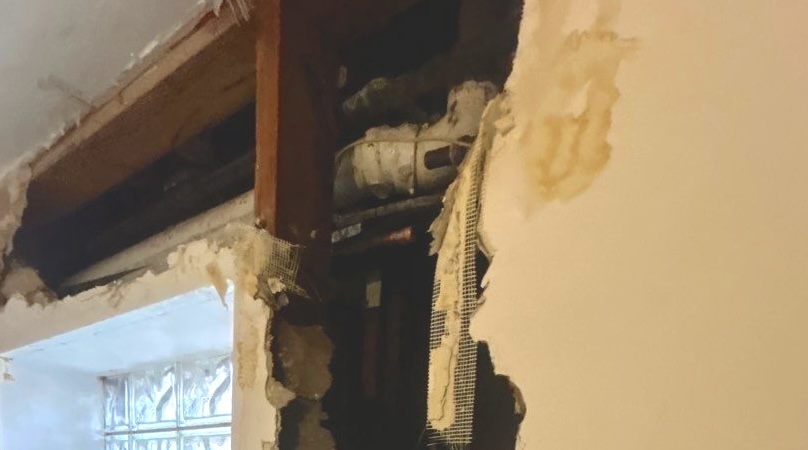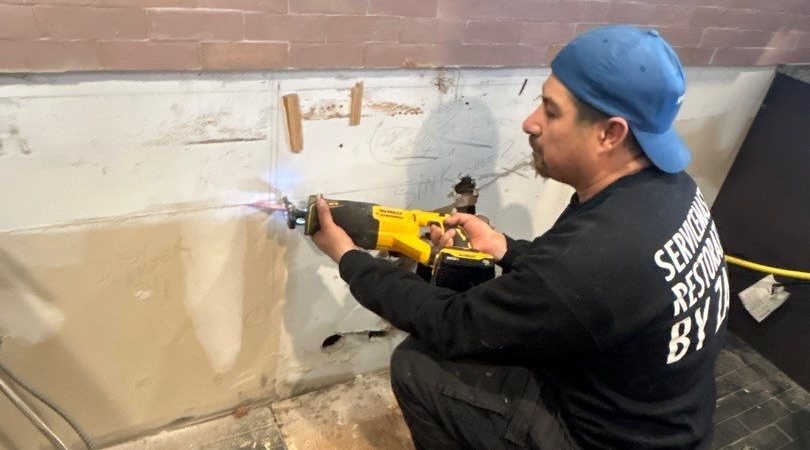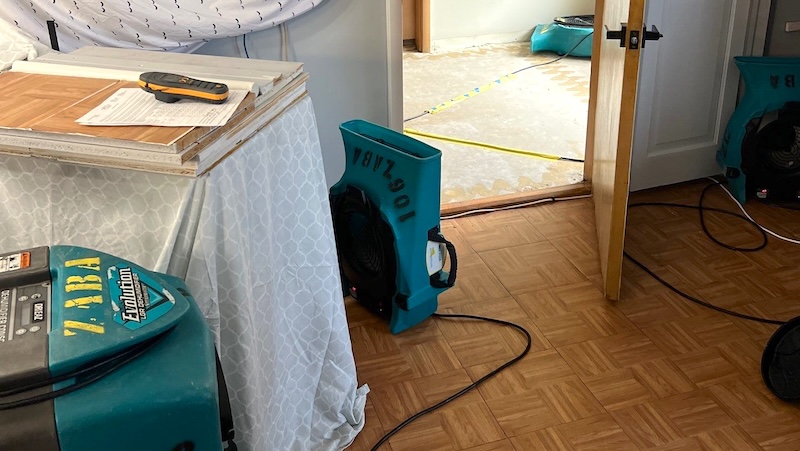A burst pipe can cause serious damage in minutes. It can soak your floors, damage your walls, and lead to expensive repairs if not handled quickly.
At ServiceMaster by Zaba, we’ve helped many Lake Bluff homeowners clean up water damage and repair their homes after a burst pipe.
In this guide, we explain what to do right away, how to stop the damage from spreading, and when to call for professional help.
Key Takeaways
- Burst pipes can quickly damage your home—wet carpets, damaged walls, and even mold if not fixed fast.
- To limit the damage: shut off the water, turn off power if needed, drain the pipes, take photos, call your insurance company, and contact a restoration team.
- ServiceMaster by Zaba is ready to respond, clean up the damage, and restore your Lake Bluff home. Call today: (847) 459-3900
What to Do When a Pipe Bursts

1. Shut Off the Water
As soon as you notice the problem, go straight to your main water shut-off valve and turn it off. This is usually found in the basement or near your water meter.
Stopping the water flow quickly helps limit how much water damage your home takes.
2. Turn Off the Power (If Needed)
Never touch electrical systems when standing in water.
If there’s water near any electrical outlets, lights, or appliances, turn off the power at the breaker.
This is a safety step to prevent electrical shock or fire.
3. Drain the Pipes
Turn on all cold water faucets and flush the toilets.
This helps empty the remaining water from the plumbing system and reduces pressure that could cause more breaks.
4. Take Photos of the Damage
Before cleaning up, take clear photos of everything that’s wet or damaged.
This includes floors, walls, ceilings, furniture, and belongings.
Your insurance company will need these photos when you file a claim.
5. Call Your Insurance Company
Let them know what happened as soon as you can.
They’ll tell you what they need to start the claim process and what repairs or cleanup may be covered.
6. Call ServiceMaster Restoration by Zaba
Once the situation is safe and you’ve spoken with your insurance provider, it’s time to give us a call.
We respond quickly and guide you through the insurance paperwork and repairs.
Our Burst Pipe Restoration Process

1. Arrive On Site
We’re on call 24/7. Once you contact us, we send a crew right away.
We check the damage, shut off any water still running, and make sure the area is safe for cleanup.
2. Remove the Water
We use high-powered pumps and vacuums to remove all standing water from your home.
This step is critical—leaving water sitting for too long can lead to more damage and mold.
3. Dry and Dehumidify
Next, we bring in industrial fans and dehumidifiers. These help pull moisture from floors, walls, and air to prevent long-term problems like mold and rot.
We monitor the drying process to make sure everything is completely dry before moving on.
4. Check and Document the Damage
We inspect every affected area, take detailed notes and photos, and check moisture levels inside walls and floors.
This documentation supports your insurance claim and helps ensure nothing gets missed during repairs.
5. Clean and Disinfect
We clean and sanitize all affected surfaces to stop mold and bacteria from spreading.
If mold has already started to form, we safely remove it using proper protective equipment and certified techniques.
6. Repair the Damage
Once everything is dry and clean, we handle the repairs—whether it’s drywall, baseboards, flooring, or cabinets.
Our goal is to get your home back to the condition it was in before the pipe burst, with as little stress on you as possible.
Burst Pipe in Lake Bluff? We’re Here to Help

A burst pipe can be stressful, but you don’t have to deal with it alone.
We help Lake Bluff homeowners every day recover from water damage after a burst pipe and get their homes back to normal.
Call us any time—we’re here 24/7 (847) 459-3900
FAQs
What causes pipes to burst?
Cold weather is the most common cause. Pipes can also burst from old age, rust, or high water pressure.
What are the signs of a burst pipe?
You might notice low water pressure, wet spots on the ceiling or walls, a musty smell, or a higher water bill.
How can I prevent burst pipes?
Here are a few simple tips:
- Insulate pipes in basements, attics, or unheated spaces.
- Keep your home warm, even when you’re away.
- Let faucets drip during very cold weather.
- Seal any cracks or gaps that let cold air near pipes.
- Check pipes for leaks or rust.
- Disconnect outdoor hoses and shut off outside water before winter.